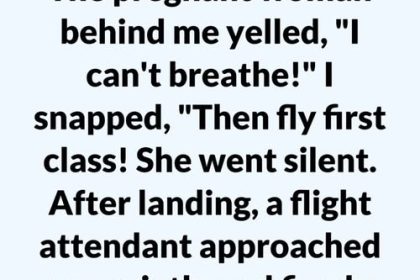After three long tours overseas, I predicted to walk into the arms of my family. Instead, the moment I stepped off the plane at Memphis International, I received a text from my husband:
“Don’t bother coming back. The locks are altered. The kids don’t want you. It’s over.”
Three sentences. That’s how Derek ended fifteen years of marriage.
I stood frozen at the arrivals gate in full dress uniform, medals shining against my chest, duffel bag slung over my shoulder. Around me, civilians rushed to reunite with loved ones, laughter and tears filling the air. Yet my world collapsed in silence. I’d survived firefights in Afghanistan, only to be ambushed in my own homecoming.
I typed back three words: “As you wish.”
What Derek never realized was that I’d been trained for betrayal. Three years earlier, before I deployed, my grandmother – Judge Cordelia Nash had sat me down in her study, walls lined with law books and framed commendations. She war:ned me, in her steady judge’s voice, never to trust blindly.
“War changes everyone, Vera,” she told me. “The ones who leave and the ones who stay. Protect yourself and your children.”
Following her advice, I signed careful documents: separate bank accounts for my combat pay, strict power of attorney limits, and a family care plan naming her as guardian if Derek faltered. The house purchased with my VA loan remained solely in my name. Derek laughed when he signed his parts. “You’re paranoid, Cordelia. Vera and I are solid.”
Now, reading his text, I silently thanked my “paranoid” grandmother. Because I hadn’t only planned supply routes in Afghanistan. I’d planned for this exact ambush.
My phone rang. Sterling Vaughn, my lawyer and former JAG officer, didn’t waste time. “Vera, Derek filed for divorce yesterday. Claimed abandonment. He wants full custody and alimony.”
I steadied my voice. “Sterling, remember Operation Homefront? Execute it. All of it.”
“With pleasure, Captain.”
As I walked into the Tennessee sunshine, another message from Derek buzzed in: “I’ve been seeing someone. Nadira gives the kids the stability you never could.”
I added it to a digital folder already filled with six months of evidence – credit card charges for jewelry and dinners, records of calls gone unanswered, screenshots of missed video chats with my children. The betrayal wasn’t sudden. It had been creeping in, like cracks spidering across glass.
Three years earlier, I’d kissed Derek and our children goodbye at Fort Campbell. Maddox, then eleven, tried to be brave though his chin quivered. Eight-year-old Brinn clung to my leg, begging me to promise we’d go to Disney World when I came back.
The first year, we managed: daily emails, weekly video calls, care packages. By my second tour, Derek’s face grew more distant on screen. He angled the camera away, claiming he looked too tired. Calls grew shorter, until they barely occured at all.
By the third tour, Maddox and Brinn were slipping away from me. Brinn stopped appearing on calls altogether. Maddox whispered that “Dad said not to bother you.” Then came the credit card alerts: luxury restaurants, a Cartier purchase Derek claimed was for a client’s wife. My gut told me otherwise.
Two weeks before my return, I called home unexpectedly. A young woman answered: Nadira. “I’m helping with the kids,” she chirped, her tone coated in false sweetness. My grandmother later confirmed seeing a moving truck at my house, unloading a new vanity and bedroom set.
Derek hadn’t simply moved on. He’d replaced m and erased me from my children’s lives, while draining my combat pay to build a fantasy with someone else.
But he underestimated me. Logistics officers don’t just hope for the best and we plan for the worst.
Sitting on a hard airport bench, I made the call that would shift everything. “Sterling, it’s time.”
I laid out every piece of evidence: notarized documents, separate accounts, the family care plan, months of screenshots. My VA loan house in my name. Eighty thousand in untouched combat pay.
“Vera,” Sterling said, awe in his voice, “you’ve outmaneuvered him completely. He thinks he set a trap, but you built the battlefield.”
That night I stayed at my grandmother’s. She had already documented Nadira’s car in my driveway, photographs of her using the garden I’d planted with my children. She even knew the school had labeled me as having “abandoned” my family—lies Derek fed to justify his actions.
My heart shattered hearing that Brinn cried daily, Maddox picked fights at school, and their counselor told them I’d chosen the Army over them. Derek’s betrayal wasn’t only marital. It was psychological warfare against my children.
“Execute Protocol 7, Grandma,” I told her. The emergency custody petition. She agreed without hesitation.
Meanwhile, Sterling froze joint accounts, filed emergency motions, and launched a forensic investigation into every dollar Derek had squandered.

The next morning, Derek’s fury exploded through texts and missed calls:
What did you do?
This is illegal!
Vera, we need to talk.
His confidence crumbled into panic. By afternoon, his lawyer begged Sterling for negotiation. I answered from my grandmother’s dining room table, Maddox and Brinn eating cookies nearby, finally safe under her guardianship.
“Counselor,” I said evenly, “you’ve confused the facts. The accounts frozen were mine alone. The house? Sold to my grandmother for fair market value – completely legal. Abandonment? Derek signed consent for every deployment.”
Sterling added, “Your client committed parental alienation, misused military funds, and moved his mistress into a soldier’s home. Should I continue?”
The line went silent. Finally: “What does Captain Holloway want?”
I answered without hesitation: “I want my children protected. I want the divorce Derek initiated. And I want him out of the house in seventy-two hours, or I press federal charges.”
At that moment, Maddox looked up at me, his voice breaking. “Dad made us call Nadira ‘Mom.’ He said you weren’t coming back.”
I pulled him close. “But I did come back. I always will.”
Brinn whispered, “Daddy said you don’t love us anymore.”
Tears blurred my vision. “Sweetheart, every day I wore your photos inside my helmet. I chose the Army for you to keep you safe, to make you proud.”
On speakerphone, Derek’s lawyer finally conceded. “We’ll accept her terms. All of them.”
Six months later, the divorce was final. Derek walked away with nothing. Nadira left the day the money dried up, screaming that he had lied about the life he promised.
Outside the courthouse, Derek spat venom: “You prepared this all along. You knew I’d betray you.”
I met his eyes steadily. “No, Derek. I prayed you wouldn’t. But I prepared in case you did. That’s what soldiers do. We hope for peace. But we prepare for wa:r.”
That night, I tucked Maddox and Brinn into beds in our new, smaller home – ours alone. Maddox had joined JROTC, inspired by my service. Brinn wrote an essay titled ‘My Mom, My Hero.’
As I turned out her light, she asked softly, “Mom, were you scared? When Dad sent that text?”
I kissed her forehead. “No, baby. Because I knew something he didn’t. Soldiers don’t just fight battles overseas. Sometimes the hardest battles are the ones we fight at home. And I’ve been trained to win.”





